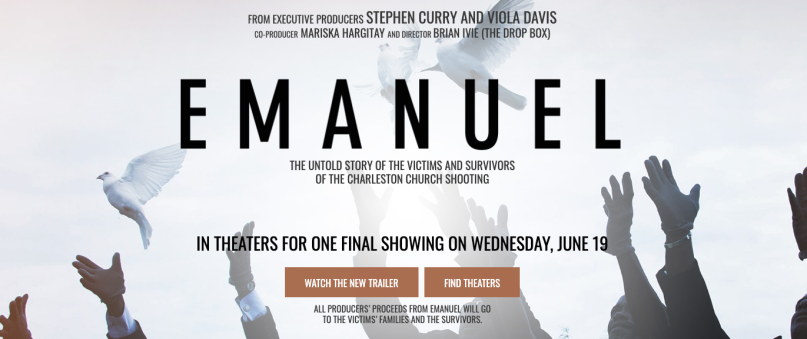Last night I had the chance to view Emanuel, a documentary directed by Brian Ivie (The Dropbox), about the shooting on June 17, 2015, at Emanuel A. M. E. Church in Charleston, SC, in which 9 people died. I attended with one of my sons, and we participated in a talk-back after the movie to reflect and process what we had seen.
For me, the movie highlighted three things that are part of my own journey and also things I hope to continue working on:
- The power of forgiveness – The documentary focuses largely on the power of forgiveness in the lives of those who lost loved ones through this trauma. On the one hand, there is the power of forgiveness to release the one who inflicted wrong into the hands of God but also the power of forgiveness to release ourselves from bitterness. This is no simplistic journey, but overall I felt the film did a good job of showing how there is spiritual strength that gives us the ability to forgive, but also how everyone processes forgiveness differently and according to different timelines. As followers of Jesus who live in light of God’s forgiveness through the Cross, we know the power of forgiveness. As Célestin Musekura says: “Because of this divine act, the Christian model of forgiveness stresses the granting of unconditional forgiveness to those who cause injury, pain and suffering in this life.”
- The need for racial healing – At various points during the film, attention is given to the racialized history of Charleston and the United States. Charleston served as a hub for the slave trade in colonial America and South Carolina was the first state to secede from the union in what led to the Civil War.By interspersing these hard realities, we are reminded of the need for racial understanding and healing in the midst of the contemporary moment in our nation. From Ferguson to Baltimore, from Oakland to Milwaukee, we cannot ignore that slavery, “America’s original sin,” has left a legacy of racial inequality, pain, and violence that cannot be ignored. We need to take steps forward both in facing into the realities that are here, as well as cultivating both personal and institutional healing of racism.
- The importance of stopping racial violence before it starts – While the documentary did not directly address ways to stop racial violence before it starts, it hinted at the reality that a wayward, lonely young man found a narrative of white supremacy that filled the gap of meaning and belonging in his life. This grabbed my attention as I considered afterwards how we might work intentionally on stopping racial violence before it starts. Where are those at the fringes of society who find belonging in sickened narratives of prejudice, injustice, and violence? How do we find them and interrupt their stories with grace, love, and shalom from God? While not easy to address, it is vital that we work as a society, as the church, and as Christians to overcome both the fruits and the roots of racial violence.
For the past six years, I have worked across racial lines with other pastors on developing ways to make a difference in our city through The Milwaukee Declaration and other organizations. Emanuel reminded me that in stepping forward with this work there is great challenge and greater hope, great darkness and greater light.
Just this morning I came across an excerpt from journalist Jennifer Berry Hawes‘ recently released account of the atrocity in Charleston in her book Grace Will Lead Us Home. There, Hawes relates how after the atrocity, Reverend Kylon Middleton, an African American pastor and husband of one of those killed, was invited to a historically white congregation to preach.
Middleton had grown up in this city, a divided one, and knew well the significance of a black pastor in a white pulpit. He approached with a ready step. When he got there, he beamed. “I never imagined in a million years coming to Second Presbyterian Church!” Sunday, he noted, remained the most segregated day of the week.
But why? They all served the same Christian God, the same one who’d brought them all together here tonight.
“Faith becomes the equalizer!”
In many ways, this was the most important change in race relations to come from the shooting. Friendships and familiarity had been born, especially within the Holy City’s largely segregated churches.
May God give us grace to step forward with such grace before more violence happens and before wounds overflow into riots, that we might meet at the foot of the Cross where healing, humility, understanding, and forgiveness can be found.
Emanuel is in theaters for a limited time. If you want to see it, there are still showings for Wednesday, June 19.
